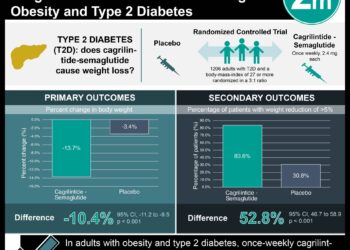SGLT-2 inhibitors not associated with increased risk for severe UTI
1. No significant difference in severe UTIs was observed between patients starting SGLT-2 inhibitors for type 2 diabetes, compared to DPP-4 inhibitors or GLP-1 agonists.
Evidence Rating Level: 2 (Good)
Study Rundown: The sodium glucose cotransporter-2 (SGLT-2) inhibitors are a newer class of diabetic medications that act by inhibiting glucose reabsorption in the proximal tubule, thereby reducing serum glucose levels. Since SGLT-2 inhibitors increase the availability of glucose in the urinary tract, there is concern the mechanism might promote bacterial growth. Studies have suggested that SGLT-2 inhibitors increase the risk of mild and moderate urinary tract infections (UTIs); however, findings are currently conflicting. This study utilized two large databases of U.S. commercial claims. The primary aim was to assess whether the initiation of SLGT-2 inhibitor therapy was associated with increased risk for severe UTIs. Inclusion criterion consisted of patients with type 2 diabetes, ages 18 or older, and had initiated SGLT-2 use, versus DPP-4 inhibitors or GLP-1 agonists. The study found that SGLT-2 inhibitors were not associated with increased risk for severe UTI compared with other anti-diabetic medications.. One limitation of this study was that the patient cohort was restricted to those with commercial insurance; therefore, the study results may not be fully generalizable to other patient groups.
Click to read the study in Annals of Internal Medicine
In-Depth [retrospective cohort study]: A population-based cohort study was conducted to assess the relationship between SGLT-2 inhibitors and frequency of UTIs compared to other diabetic medications. Data was retrieved from 2 large U.S. based databases of commercial claims from March 2013 to September 2015. There were two main cohorts of patients. In the first cohort, patients starting SGLT-2 inhibitors were compared with those starting a dipeptidyl peptidase-4 (DPP-4) inhibitor. The second cohort included patients starting use of an SGLT-2 inhibitor compared to a glucagon-like peptide-2 receptor (GLP-1) agonist. Patients at high risk of UTI development were excluded from the study. Following inclusion and exclusion criteria, cohort 1 consisted of 86 665 patients using SGLT-2 inhibitors and 136 741 patients using DPP-4 inhibitors; cohort 2 consisted of 107 289 patients using SGLT-2 inhibitors and 67 871 patients using GLP-1 agonists. Logistic regression was utilized to calculate propensity scores. After propensity scores were calculated, the SGLT-2 inhibitor group resulted in 61 severe UTI events (IR, 1.76 cases per 1000 person-years) compared to 59 in the DPP-4 inhibitor group (IR, 1.77 cases per 1000 person-years). These values correspond to an adjusted HR of 0.98 (CI, 0.68 to 1.41). Similarly, there were 73 events in the SGLT-2 inhibitor group IIR, 2.15 cases per 1000 person-years) and 87 events in the GLP-1 agonist group in cohort 2 (IR, 2.96 cases per 1000 person years), resulting in a HR of 0.72 (CI, 0.53 to 0.99).
Image: PD
©2019 2 Minute Medicine, Inc. All rights reserved. No works may be reproduced without expressed written consent from 2 Minute Medicine, Inc. Inquire about licensing here. No article should be construed as medical advice and is not intended as such by the authors or by 2 Minute Medicine, Inc.







